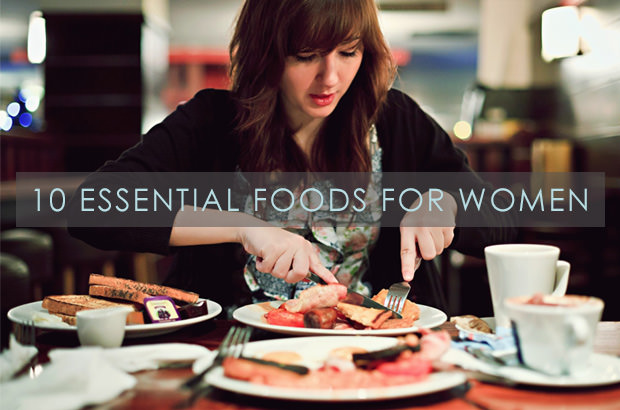
10 Essential Foods For Women

Posted on 13 Feb, 2022

Don’t just toss any old food into your cart -- have a plan. What you grab off the shelf and stock in your fridge or pantry can help shore up your nutrient gaps and protect your heart, breasts, bones, brain and waistline. So what are the healthiest picks? Check out these 10 most nutritious foods for women, and be sure to add them to your shopping list.
Foods and Nutrients You Need Now
 When it comes to eating a nutrient-rich diet, chances are you’re falling short. In fact, according to the 2015 Dietary Guidelines for Americans, many women aren’t getting enough fiber, potassium, choline, magnesium, calcium, iron and vitamins A, D, E and C. A nutrient-poor diet that is high in low-quality foods and lacking in important food groups like fruits and veggies, whole grains, dairy and seafood is contributing to the nutrient shortfalls. Add these 10 foods to your shopping list to increase nutrition and reduce risk for chronic diseases.
When it comes to eating a nutrient-rich diet, chances are you’re falling short. In fact, according to the 2015 Dietary Guidelines for Americans, many women aren’t getting enough fiber, potassium, choline, magnesium, calcium, iron and vitamins A, D, E and C. A nutrient-poor diet that is high in low-quality foods and lacking in important food groups like fruits and veggies, whole grains, dairy and seafood is contributing to the nutrient shortfalls. Add these 10 foods to your shopping list to increase nutrition and reduce risk for chronic diseases.
1. Greek Yogurt
 Say yes to yogurt -- but go Greek for bone-building calcium as well as extra benefits! Greek yogurt has the same calcium and about twice the protein of traditional yogurt (and it contains far less sugar). Protein is a real power nutrient, upping the fullness factor and helping to build muscle (which increases metabolism), making it a weight-loss win.
Say yes to yogurt -- but go Greek for bone-building calcium as well as extra benefits! Greek yogurt has the same calcium and about twice the protein of traditional yogurt (and it contains far less sugar). Protein is a real power nutrient, upping the fullness factor and helping to build muscle (which increases metabolism), making it a weight-loss win.
So how much protein should you eat? Research suggests that eating higher levels (30 percent of your total daily calories) helps women with weight loss and muscle maintenance and promotes healthier aging. Grab your spoon and enjoy the thick creaminess of plain Greek yogurt (with no added sugars) with fresh fruit.
[Related: Fermented Foods And Why They Are So Good For You]
2. Prunes
 The high-fiber fruit can help you get the 25 grams you need daily to keep hunger at bay and improve your overall GI health, but here’s another prune perk: They bolster bone health. Eating five or six prunes per day can help improve bone density and may help slow bone loss in postmenopausal women, according to a San Diego State University study. In addition to fiber, prunes give you much-needed vitamin K, boron, magnesium, potassium and polyphenols. You can enjoy them as an on-the-go snack option or add them to Greek yogurt (another superfood). And bet you didn’t know that prunes can replace some of the fat in certain chocolate baked goods like brownies or chocolate cake.
The high-fiber fruit can help you get the 25 grams you need daily to keep hunger at bay and improve your overall GI health, but here’s another prune perk: They bolster bone health. Eating five or six prunes per day can help improve bone density and may help slow bone loss in postmenopausal women, according to a San Diego State University study. In addition to fiber, prunes give you much-needed vitamin K, boron, magnesium, potassium and polyphenols. You can enjoy them as an on-the-go snack option or add them to Greek yogurt (another superfood). And bet you didn’t know that prunes can replace some of the fat in certain chocolate baked goods like brownies or chocolate cake.
3. Berries
 Berries are loaded with nutrients you need more of, and they may be your breasts’ best friend. The little fruit delivers big when it comes to nutrients: They’re rich in vitamin C, potassium, folic acid, fiber and antioxidants, including anthocyanins. One study suggests that blueberries in particular may boost the popular drug tamoxifen’s ability to fight breast cancer cells. If the breast benefits aren’t impressive enough, berries may also help protect your skin and hair, reduce inflammation and slow age-related memory loss. Pop raspberries or blackberries as a quick and easy (and, of course, delicious) snack, add sliced strawberries to your morning bowl of oatmeal or cereal or freeze blueberries and enjoy them as a sweet treat instead of a sugary dessert.
Berries are loaded with nutrients you need more of, and they may be your breasts’ best friend. The little fruit delivers big when it comes to nutrients: They’re rich in vitamin C, potassium, folic acid, fiber and antioxidants, including anthocyanins. One study suggests that blueberries in particular may boost the popular drug tamoxifen’s ability to fight breast cancer cells. If the breast benefits aren’t impressive enough, berries may also help protect your skin and hair, reduce inflammation and slow age-related memory loss. Pop raspberries or blackberries as a quick and easy (and, of course, delicious) snack, add sliced strawberries to your morning bowl of oatmeal or cereal or freeze blueberries and enjoy them as a sweet treat instead of a sugary dessert.
4. Tomatoes
 No matter how you say it, tomatoes are nutrient powerhouses. The fruit (yes, it’s a fruit) is rich in vitamins A and C, potassium and lycopene, a phytonutrient that’s responsible for the beautiful red color. Observational studies suggest that lycopene may help reduce the risk of certain cancers (including breast and cervical), and other research shows it can protect your pumper. In a study from Harvard School of Public Health, researchers found that women with the highest blood levels of lycopene slashed their heart disease risk in half. Feel free to enjoy fresh or cooked tomatoes (from a glass jar or BPA-free can). Aside from being convenient, cooked tomato products contain a more absorbable form of lycopene.
No matter how you say it, tomatoes are nutrient powerhouses. The fruit (yes, it’s a fruit) is rich in vitamins A and C, potassium and lycopene, a phytonutrient that’s responsible for the beautiful red color. Observational studies suggest that lycopene may help reduce the risk of certain cancers (including breast and cervical), and other research shows it can protect your pumper. In a study from Harvard School of Public Health, researchers found that women with the highest blood levels of lycopene slashed their heart disease risk in half. Feel free to enjoy fresh or cooked tomatoes (from a glass jar or BPA-free can). Aside from being convenient, cooked tomato products contain a more absorbable form of lycopene.
5. Pistachios
 Pistachios, like other nuts, are often left by the wayside when it comes to weight-loss diets because they’re high in calories and fat. But the truth is that they’re a triple threat when it comes to losing pounds. They’re one of the lowest-fat, lowest-calorie nuts (49 pistachios is a serving), and they have a shell, which helps slow down your snacking. Pistachios are also unique in that they are the only nut to have lutein and zeaxanthin, two antioxidants that help to reduce age-related macular degeneration, a condition that is more common in women than men and impacts 14 percent of people 55 to 64 years of age and one out of five people 65 to 75 years old.
Pistachios, like other nuts, are often left by the wayside when it comes to weight-loss diets because they’re high in calories and fat. But the truth is that they’re a triple threat when it comes to losing pounds. They’re one of the lowest-fat, lowest-calorie nuts (49 pistachios is a serving), and they have a shell, which helps slow down your snacking. Pistachios are also unique in that they are the only nut to have lutein and zeaxanthin, two antioxidants that help to reduce age-related macular degeneration, a condition that is more common in women than men and impacts 14 percent of people 55 to 64 years of age and one out of five people 65 to 75 years old.
6. Salmon
 Chances are, you’re not eating the recommended eight ounces of seafood a week to boost the vitamin D and omega-3 fats in your diet. If you need more seafood servings, consider salmon. It’s a healthy protein loaded with omega-3 fats, which have been shown to help fight inflammation and may also protect your bones. If you reel in a fish dish in place of red meat, all the better, as most experts recommend limiting your intake, especially of fatty, processed meats like bacon and deli meats. Pregnant women can also help their baby-to-be by selecting salmon: In one study, women who had a low fish intake were at an increased risk for preterm delivery and low birth weight.
Chances are, you’re not eating the recommended eight ounces of seafood a week to boost the vitamin D and omega-3 fats in your diet. If you need more seafood servings, consider salmon. It’s a healthy protein loaded with omega-3 fats, which have been shown to help fight inflammation and may also protect your bones. If you reel in a fish dish in place of red meat, all the better, as most experts recommend limiting your intake, especially of fatty, processed meats like bacon and deli meats. Pregnant women can also help their baby-to-be by selecting salmon: In one study, women who had a low fish intake were at an increased risk for preterm delivery and low birth weight.
[Related: Farmed Salmon Is Healthier Than You Think]
7. Legumes (Beans, peas, lentils, soybeans and chickpeas)
 Need a reason to love legumes? Here’s one: They’re packed with fiber, which you probably aren’t getting enough of, and they may help you peel off pounds. Most women are only eating 15 grams of fiber day, falling short of the recommended 25 grams. What’s more, legumes provide potassium, magnesium, zinc and B vitamins.
Need a reason to love legumes? Here’s one: They’re packed with fiber, which you probably aren’t getting enough of, and they may help you peel off pounds. Most women are only eating 15 grams of fiber day, falling short of the recommended 25 grams. What’s more, legumes provide potassium, magnesium, zinc and B vitamins.
A recent study in the Journal of Human Nutrition and Dietetics finds that overweight people who ate a diet rich in beans lost nearly 10 pounds in 16 weeks while also improving their blood cholesterol levels. This could be a result of the food’s “full factor”: People who ate about one cup (5.5 ounces) of legumes felt 31 percent fuller than those who didn’t enjoy legumes, finds a study in the journal Obesity. Stash several cans of beans, lentils, peas and chickpeas in your pantry and use them to whip up fuss-free meals like soups, chili and burritos.
8. Brussels Sprouts
 Not a fan of Brussels sprouts? You may just stop turning up your nose at the oft-ignored veggie when you learn the cruciferous cutie is as packed with nutrients as broccoli and cauliflower. Brussels sprouts are a good source of vitamins A and C, B vitamins, fiber, potassium, magnesium and fiber. They also contain glucosinolates, which have been shown to help protect against cancer.
Not a fan of Brussels sprouts? You may just stop turning up your nose at the oft-ignored veggie when you learn the cruciferous cutie is as packed with nutrients as broccoli and cauliflower. Brussels sprouts are a good source of vitamins A and C, B vitamins, fiber, potassium, magnesium and fiber. They also contain glucosinolates, which have been shown to help protect against cancer.
Still sprout-shy? Try this tasty tip: Roast Brussels sprouts with a little olive oil and the seasonings of your choice. Overboiled, stinky sprouts have given the vegetable a bad rep, but if you cook them properly, you have a deliciously crunchy side dish. It’s most definitely time to give them a second chance if you’ve scratched them from your menu.
[Related: The Health Benefits Of Sprouts]
9. Pink Grapefruit
 Check out this sweet news about this bigger fruit: Grapefruit is a super source of vitamins A, C, B-1 and B-5 as well as fiber and potassium. You may want to enjoy half a grapefruit before meals -- it provides more than half of all the vitamin C you need in a day.
Check out this sweet news about this bigger fruit: Grapefruit is a super source of vitamins A, C, B-1 and B-5 as well as fiber and potassium. You may want to enjoy half a grapefruit before meals -- it provides more than half of all the vitamin C you need in a day.
Grapefruit helps reduce blood pressure, which more than 30 percent of women struggle with, and this citrus fruit may help protect against certain forms of cancer. That’s likely a result of this triple threat of health-boosting compounds: the antioxidant lycopene, the phytonutrient limonoid and the flavonoid naringenin. Another produce perk: Grapefruit contains pectin, a soluble fiber that helps reduce total cholesterol, and may aid weight loss.
[Related: Flu Fighting Foods]
10. Walnuts
 Go ahead and embrace your nutty side. Walnuts contain many beneficial nutrients like magnesium, calcium, vitamin E, fiber, protein and omega-3 fatty acids. Plus, walnuts may help protect your breasts. Just two ounces a day was shown to help delay tumor growth in mice, finds a study in the journal Nutrition and Cancer. Experts aren’t sure what compound is responsible for this benefit (the nuts’ phytosterols, which work as antioxidants, the omega-3 fats, polyphenols, carotenoids or melatonin), but there’s one thing on which we can all agree: Walnuts are totally delicious -- whether you nosh on a handful between meals or add them to a nice beet and goat cheese salad.
Go ahead and embrace your nutty side. Walnuts contain many beneficial nutrients like magnesium, calcium, vitamin E, fiber, protein and omega-3 fatty acids. Plus, walnuts may help protect your breasts. Just two ounces a day was shown to help delay tumor growth in mice, finds a study in the journal Nutrition and Cancer. Experts aren’t sure what compound is responsible for this benefit (the nuts’ phytosterols, which work as antioxidants, the omega-3 fats, polyphenols, carotenoids or melatonin), but there’s one thing on which we can all agree: Walnuts are totally delicious -- whether you nosh on a handful between meals or add them to a nice beet and goat cheese salad.
What Do YOU Think?
Do you enjoy any of these foods regularly? If so, which ones? Are there any foods from this list that you'll add to your diet? Any foods you felt were left off the list? Share your thoughts with us in the comments below.
Our Favorite Books On Eating Healthy

by Kris Carr

by Michael Pollan

by Miyoko Schinner

by Michael Greger
 Basic Calisthenics
Basic Calisthenics Common Food Labels And What They Mean
Common Food Labels And What They Mean How To Pick The Best Milk For Yourself
How To Pick The Best Milk For Yourself 9 Unhealthy, Even Dangerous Weight-Loss Diets
9 Unhealthy, Even Dangerous Weight-Loss Diets










